Solar panel technology has evolved rapidly over recent years.
So much so, in fact, that the solar industry can now offer many different solar panel types to help you capture sunlight.
Whether you want to use silicon cells to achieve independence from your electricity supplier, save on energy bills, or help the environment, you're sure to find the right solar panel for your needs.
To find that solar panel, however, we will need to look at the four main types of commercially available solar panels.
We'll examine their strengths, weaknesses, and what to look for in a panel.
The right solar panels - which are also known as PV panels because of their photovoltaic properties - can help you generate electricity for years without eating up your entire roof space.
To find out which types of solar panels would work best, given your requirements, we must look at the four main types of panels that solar panel manufacturers produce and carry:
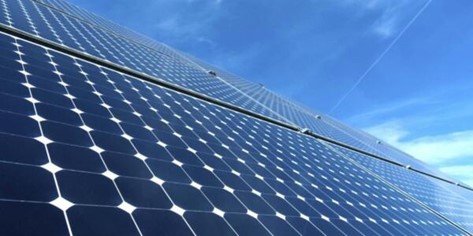
As the name implies, monocrystalline solar panels utilise a single silicon crystal to construct thin silicon wafers and create monocrystalline solar cells.
This gives them their dark colour and octagonal shape.
This pure silicon crystal is then dipped in molten silicon to create an ingot which is turned into solid silicon wafers. These then become monocrystalline cells which offer more room for electricity to flow.
Monocrystalline solar panels tend to have a high solar panel efficiency rating of between 15 and 20%, with a maximum conversion efficiency rating of 24% in some cases.
This type of solar cell is known for its sleek, pleasing appearance, high levels of efficiency, and long lifespan of 30-50 years. However, it's the least affordable type due to the amount of silicon wasted.
If power generation, panel efficiency or aesthetic design are your main concerns, you can't go wrong with monocrystalline panels.
They're arguably the best panels on the market if you can afford them!
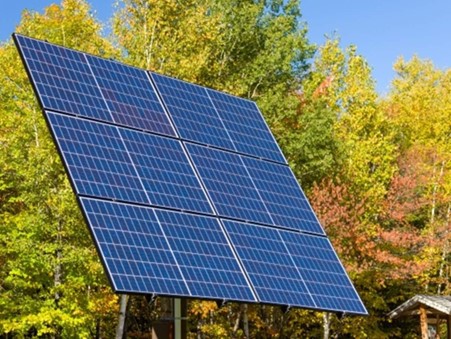
A polycrystalline panel is made of melted silicon poured into square moulds, which is an immediate contrast to the ingots used to create monocrystalline panels.
This production method gives it its distinctive blue mosaic look, which, although not as pleasing as monocrystalline designs, is still a welcome sight on any British roof.
Polycrystalline solar panels are known to be cheaper than monocrystalline panels but possess lower efficiency ratings, often around 13-15%. They have a comparable 30-40 year total lifespan.
Both monocrystalline and polycrystalline panels are made with silicon or silicon fragments, which gives them durability and longer lifespans.
Polycrystalline cells waste little silicon in production, which makes them much cheaper at about £225–£250 per panel.
This lower efficiency panel type works best for users who don't have to worry about limited space and can afford to fill their roofs with solar panels.
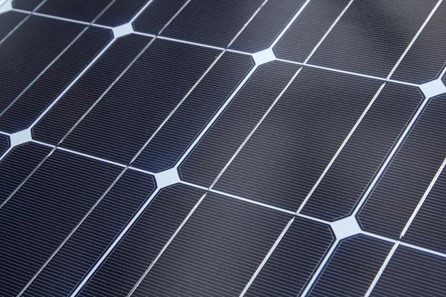
PERC panels that utilise rear contact cells are a type of monocrystalline solar panel that offers the greatest solar collection possible, possessing an extra 5% efficiency over ordinary monocrystalline solar panels.
Unlike traditional crystalline panels, this type of solar panel contains a passivation layer, locatedon the bottom layer of the panel.
This layer allows the solar cells to absorb light waves that would have passed through normal solar panels, increasing the PERC's overall efficiency and making it the best choice for smaller spaces.
While PERC panels are slightly more expensive to produce and have a higher cost upfront, they offer a lower cost per watt, one that is similar to thin film panels, allowing you to save money in the long run.
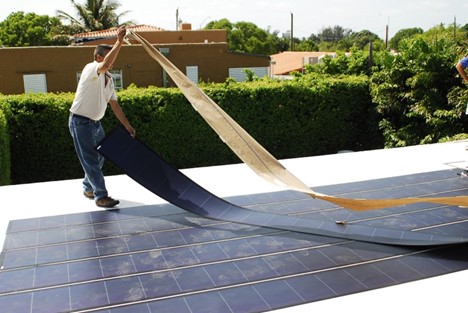
Thin film solar panels are very different in appearance and design from monocrystalline and polycrystalline panels. This is because of their manufacturing process and the materials used.
A thin film solar panel can utilise the widest variety of PV material out of any other options on this list, including potential PV substances such as amorphous silicon.
Thin film solar cells are the least efficient type of solar cells because they are made of a thin layer of PV material mounted on top of a solid surface, most often glass.
These transparent conducting layers generally offer panel efficiency of 7-13%, which, while far lower than in crystalline panels, is much cheaper than the other options.
Thin film panels blend into their environment rather than take up roof space, are cheap at £200–£250 per panel, and are flexible enough to bend and roll. However, they generally only last 10–20 years.
Here are some of the materials that make up the individual solar cells found in thin film solar panels:
A-Si panels have the lowest efficiency of any solar panel at 6-8%, but they are the cheapest option.
Thin film solar panels made of CdTe offer slightly higher efficiency levels of 9-11%.
One thin film panel made with CIGS can offer 11-15% efficiency, which is almost as high as polycrystalline panels while still being less expensive.
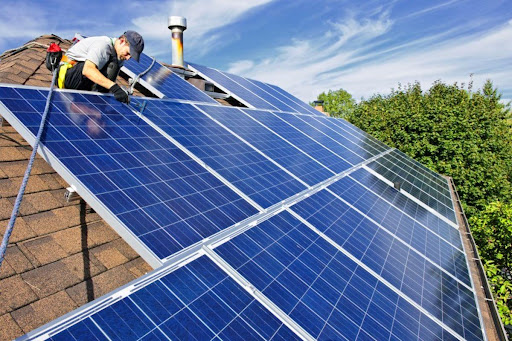
To choose the best possible solar panels that will keep your lights on and not empty your wallet, you will need to consider the following factors:
Different types of solar panels yield different efficiency ratings due to their manufacturing process, which leads to varying levels of PV effect.
Function should be your number one concern when choosing panels. Traditional solar panels utilising monocrystalline or polycrystalline solar cells tend to fare best in this regard.
If efficiency is paramount for you, you should use PERC and monocrystalline panels for your home.
This is thanks to monocrystalline panels possessing 15-20% efficiency and PERC going up to 10% beyond it.
Thin film solar panels or even solar tiles work best if you are concerned about size as a thin film solar panel can be laid like matting on top of your existing roof tiles.
Traditional solar panels tend to be bulky and don't really follow the shape of your roof well, so thin film panels excel in this regard.
They allow you to have lower-profile solar panels without sacrificing efficiency!
Monocrystalline solar panels are the most aesthetically pleasing type of panels, as monocrystalline solar cells are made of pure silicon, which gives them a distinctive dark colour.
If monocrystalline panels are too bulky for your needs, thin film solar panels are more low profile and blend in better with the overall design of your house.
You may even want to give transparent cells a try if you don't want the appearance of solar panels at all, as these can take the place of your windows.
Monocrystalline solar panels are the most expensive type of panels, with most costing around £250–£375 on average.
A polycrystalline solar panel is the best middle-of-the-road choice as it is better than a thin film panel without being as expensive as monocrystalline panels.
Regardless of the material used, thin film solar panels are the cheapest to purchase and cost the lowest per watt.
Meanwhile, PERC panels cost the most per panel but are the cheapest in the long run as you save more money per watt.
Power capacity is another major factor to consider when choosing solar cells and solar panels as the reason you want them is to help power your home.
Monocrystalline cells have the highest power capacity and output at 300W thanks to their silicon solar cells, which allow for more electricity to pass through.
Polycrystalline panels come in a close second at 240-300W, thanks to ever-improving solar technology. A good polycrystalline panel will power your home with ease.
Meanwhile, thin film solar panels are more varied as they are made of different materials, though they will normally generate less power than polycrystalline panels.
The temperature coefficient refers to the degradation in performance that comes when the panel gets hot. The hotter a panel gets, the less power it can generate.
Solar panels such as polycrystalline solar cells have a coefficient of -0.3% / °C to -0.5% / °C, which is standard for most solar panels on the market.
Thin film solar panels, on the other hand, have a lower temperature coefficient, making them more ideal in hot environments than monocrystalline or polycrystalline panels.
Solar panels are outdoor power sources by nature. This means that they'll be exposed to the elements.
Your chosen panel should be able to withstand any barrage that comes its way.
They should be fire-resistant up to a certain point and able to deal with heavy downpours, debris coverage, and other harsh weather conditions that may destroy them.
Solar panels are quite an investment. Before purchasing a set of panels, it's best to do your due diligence and learn as much about these pieces of technology as possible.
Here are the answers to some of the most pertinent questions potential users may have regarding solar panels:
Choosing the right solar panel system for your home or office is quite subjective. The right choice will depend on your available space, budget, and power capacity requirements.
That said, you can choose the following solar panels in the given conditions:
There are many different types of solar panels on the market, the four main types being monocrystalline solar panels, polycrystalline panels, thin film panels, and PERC panels.
These types of solar panels are differentiated by their manufacturing process, how their solar cell is made, and other factors such as efficiency, power output, looks, cost, and space.
Whichever solar panel type you choose, you must ensure that it saves you money in the long run. It should be the most efficient, long-lasting, durable, and pleasing to the eye!
Did you know that Solar Panel Installation can match you with 3 local installers who will provide you with a free quote? Fill out our form today to get in touch with installers.